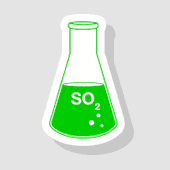Food Allergens
Some information on the 14 allergens

1. Egg
Egg allergy is a hypersensitivity to dietary substances from the yolk or whites of eggs, causing an overreaction of the immune system.
Do not consume any food and products that contain egg and egg derivatives.
Food products that contain or may contain egg include meringue, mayonnaise, creamy sauces & salad dressings (e.g. tartare, hollandaise) baked goods, creamed filled desserts (e.g. some ice creams, custard).

2. Milk
A milk allergy is an adverse immune reaction to one or more of the constituents of milk from any animal.
Do not consume any food and products that contain milk and milk derivatives.
Food products that contain or may contain milk include milk (in all forms), milk powder, buttermilk, yoghurt, cream, ice cream, cheese, custards, pudding, food glazed with milk, margarine, whitener, chocolate, baked goods, instant /mashed potatoes.

3 and 4. Shellfish and Molluscs
Food allergy to shellfish is relatively common. Along with peanuts and tree nuts, shellfish are some of the most frequent triggers of anaphylactic reactions.
Allergy to molluscs has been reported less frequently than allergy to shellfish.
As shellfish and molluscs contain the same type of proteins some people may react to both food groups.
Do not consume any food and products that contain crustaceans and molluscs and their derivatives.
Shellfish include shrimps, prawns, crayfish and lobster.
Molluscs contain clams, cockles, mussels, octopus, snails, squid and scallops.
See (5. Fish) for foods/products that contain or may contain fish including shellfish and molluscs.

5. Fish
Finned fish can cause severe allergic reactions and is usually a life-long allergy.
Do not consume food and products that contain fish and fish derivatives. The most commonly studies fish with respect to allergy are cod, salmon and Tuna.
Food /products that contain or may contain fish include ethnic foods (e.g. fried rice, paella, spring rolls), salad dressing and sauces (e.g. Worcestershire, soy, barbeque), seafood soups and broths, pizza, dips and relishes.

6. Peanuts
Peanut allergy is a hypersensitivity reaction to dietary substances from peanuts causing an overreaction of the immune system. It is a type of food allergy distinct from tree nut allergies.
Do not consume food and food products that contain peanuts and peanut derivatives.
Food /products that contain or may contain peanuts include peanut butter, ethnic foods (e.g. African, Asian, Mexican) vegetarian meat substitutes, sauces and dressings (e.g. chilli, pesto, gravy, enchilada, satay) baked goods, sweets and cereals (e.g. cake, pudding, cookies, cereal bar, nougat, marzipan), desserts, vegetarian products, pizza.

7. Sesame
Sesame allergy is a hypersensitivity to dietary substances from sesame seeds causing an overreaction of the immune system.
Do not consume food and products that contain sesame and sesame derivatives.
Food /products that contain or may contain sesame include bread (e.g. burger buns, multi-grains), crackers, cereals, toast, dips and spread (e.g. hummus, chutney), ethnic foods (e.g. stews, stir fries), sesame oil, savoury products (e.g. dressings, gravies, marinades, soups).

8. Soy
Soy allergy is a hypersensitivity to dietary substances from soy causing an overreaction of the immune system. Symptoms of soy allergy are typically mild, although anaphylaxis is possible.
Do not consume food and food products that contain soy and soy derivatives.
Foods / products that contain or may contain soy include soybean butter, soy milk, sauces (e.g. soy, teriyaki, Worcestershire), bread crumbs, cereals, crackers, vegetarian dishes, canned tuna, soups and broths.

9. Sulphur Dioxide
Sulphur Dioxide (A food additive and preservative)
Sulphur Dioxide can cause allergy-like symptoms in people with underlying asthma and allergic rhinitis. The most common reaction is wheezing, tight chest and cough, which can be severe and distressing.
Do not consume all food and products that contain sulphur dioxide derivatives.
Food /products that may contain sulphur dioxide include alcoholic and non-alcoholic drinks, bottle juices, canned, frozen and dried fruit and vegetables, cereals, condiments, potatoes, sugar syrups, tomato products (e.g. tomato paste, puree), vinegar.

10. Nuts
Nut allergy is a hypersensitivity to dietary substances from tree nuts causing an overreaction of the immune system which may lead to severe physical symptoms. Like those with peanut allergies, most individuals who are diagnosed with an allergy to tree nuts tend to have a lifelong allergy.
Do not consume food and products that contain nuts and nut derivatives Nuts include but are not limited to almonds, walnuts, pecan nuts, hazelnuts, Brazil nuts, cashews, pistachio nuts.
Food /products that contain or may contain nuts include marzipan, chocolate and chocolate spreads, ethnic and vegetarian dishes, salads and dressings, sauces (e.g. bbq, pesto),cereals, crackers, marinades and gravies.

11. Cereals containing gluten / Gluten Intolerance / Coeliac Disease
Gluten intolerance is caused by the body’s inability to break down gluten, a protein in wheat and other grains.
Coeliac disease is a digestive condition caused by gluten intolerance. Those with Coeliac disease must eliminate gluten from their diet.
Allergy to wheat and cereals containing gluten also occurs. Signs and symptoms are similar to other allergies, although it is more frequently seen as triggered by exercise. Gluten is an important allergen, but other proteins can also be involved.
Do not consume food and products derived from or containing wheat (all forms including durum, semolina), barley, rye, malt, couscous.
Food /products that contain or may contain wheat include bread, baked goods, pasta, breadcrumbs, crackers, beer, malt, coffee, muesli mixes, sauces, chocolate, drinks containing cocoa

12. Celery (and celeriac).
Allergy to celeriac (the celery root) is more common than to celery stick, although both can cause severe reactions. Symptoms vary from mild ones, such as oral allergy syndrome, to anaphylactic shock.
Celery and celeriac are a frequent cause of food allergy in some European countries but celery allergy is much rarer in the UK.
Food /products that contain or may contain celery include celery salt, vegetable juices containing celery, spice mixes, curry, soups, stews, sauces, processed meat products, sausages, salads e.g. Waldorf salad, vegetable salad, savoury snacks.

13. Mustard
The symptoms of mustard allergy may come on rapidly, usually within minutes but sometimes up to two hours.
Food /products that contain or may contain mustard include sausages, processed meat products, roulade, spice mixes, soups, sauces, chutneys, delicatessen salad, some mayonnaise, barbeque sauce, ketchup, tomato sauce, piccalilli, pizza, salad dressings, Indian food including curries.

14. Lupin
The lupin is well-known as a popular garden flower with its tall, colourful spikes. Allergy to lupin has been recognised for some time in mainland Europe, where lupin flour is used fairly commonly in food products. In the UK, cases of lupin allergy are less common because lupin is only rarely used in foods.
